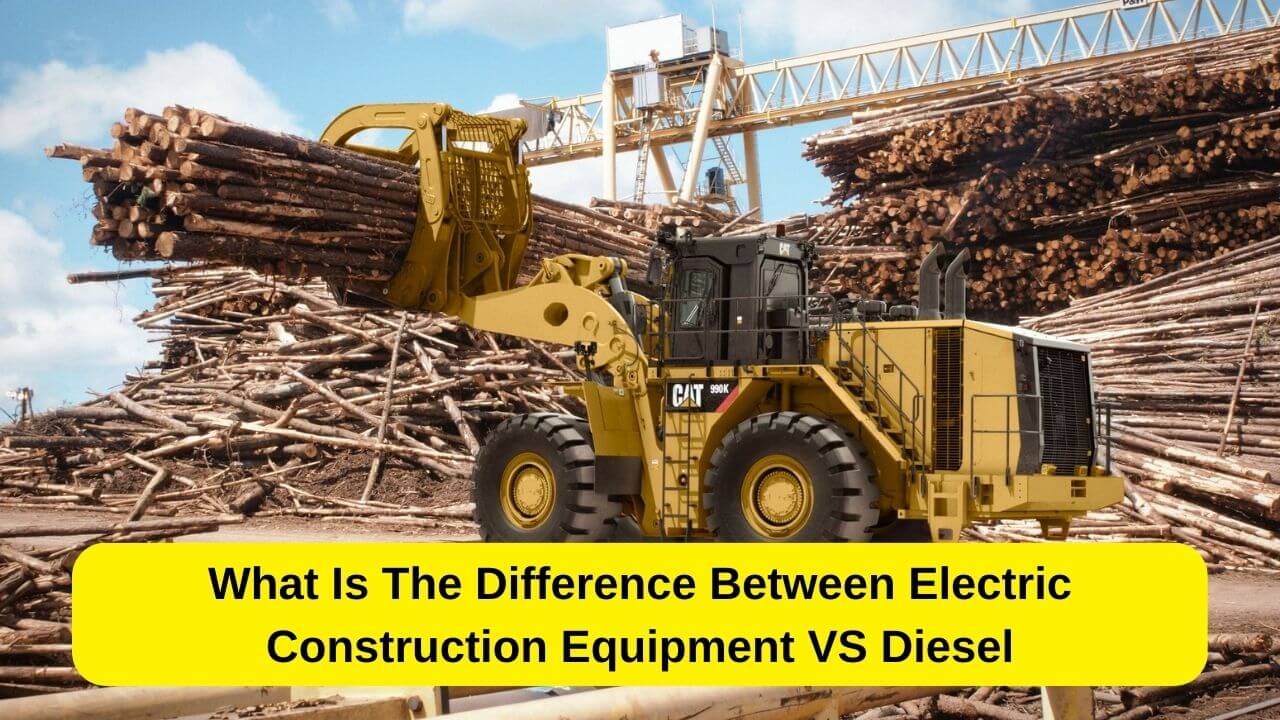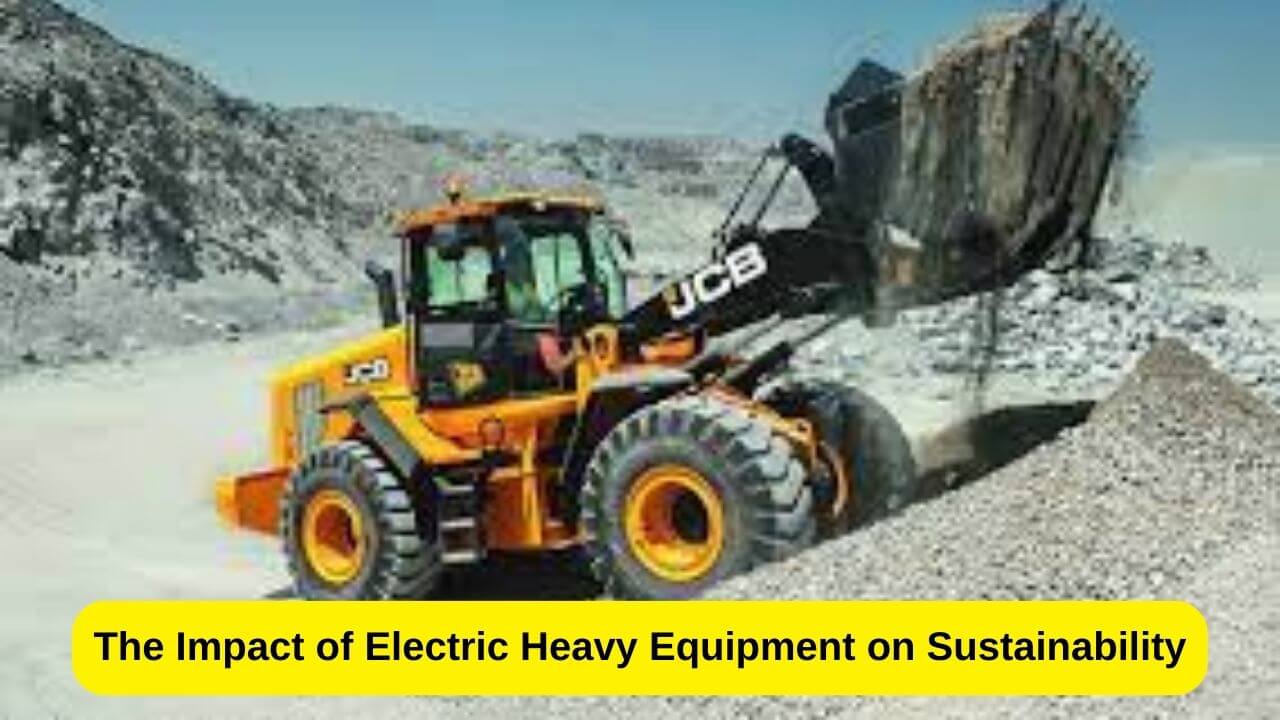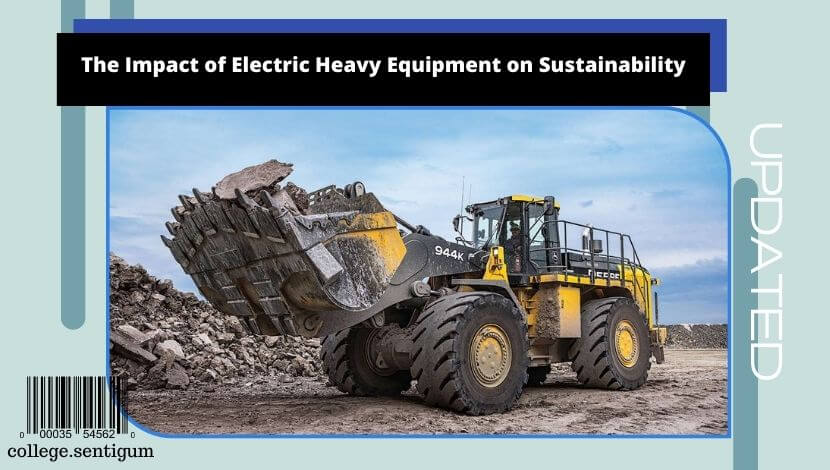The Impact of Electric Heavy Equipment on Sustainability – Electric construction equipment refers to machinery and vehicles used in construction and infrastructure development that are powered by electricity instead of traditional diesel or gasoline engines.
These equipment are designed to perform similar tasks as their conventional counterparts but with the benefits of reduced emissions, improved energy efficiency, and lower operating costs.
Some examples of electric construction equipment, such as: Excavators, Loaders, and et cetera.
It’s important to note that the availability and range of electric construction equipment may vary depending on the region and market conditions.
As technology continues to advance and demand for sustainable solutions grows, the range and capabilities of electric construction equipment are expected to expand.
What Is The Difference Between Electric Construction Equipment VS Diesel

Electric construction equipment and diesel construction equipment differ in their power sources, emissions, energy efficiency, operating costs, and environmental impact.
Here are some key differences between the two:
Power Source
Electric construction equipment is powered by electricity, typically stored in batteries, while diesel construction equipment relies on diesel fuel combustion in internal combustion engines.
Emissions
Electric construction equipment produces zero tailpipe emissions during operation, contributing to cleaner air quality and reduced greenhouse gas emissions.
Diesel construction equipment emits pollutants such as carbon dioxide (CO2), nitrogen oxides (NOx), particulate matter (PM), and sulfur oxides (SOx), contributing to air pollution and climate change.
Energy Efficiency
Electric construction equipment tends to have higher energy efficiency compared to diesel equipment.
Electric motors have higher energy conversion rates and do not suffer from idling losses like internal combustion engines.
This results in reduced energy waste and lower operating costs over the equipment’s lifespan.
Noise Pollution
Electric construction equipment operates more quietly than diesel equipment.
The absence of engine noise and reduced vibration make electric equipment particularly suitable for noise-sensitive environments such as urban areas, hospitals, schools, and residential areas.
Operating Costs
Electric construction equipment generally has lower operating costs compared to diesel equipment.
Although electric equipment may have higher upfront costs, they benefit from lower fuel costs, reduced maintenance requirements (fewer parts and fluids to maintain), and potential savings on emission-related regulations and compliance.
Infrastructure
Electric construction equipment requires access to charging infrastructure to recharge their batteries.
Diesel equipment, on the other hand, can be refueled at existing diesel fueling stations.
The availability and accessibility of charging infrastructure may be a consideration for electric equipment adoption in certain areas.
Flexibility and Range
Diesel equipment typically has longer operating ranges and quicker refueling times compared to electric equipment.
Electric equipment may require more planning for charging and have limited range, although advancements in battery technology are continually improving the range and charging capabilities of electric construction equipment.
Lifecycle Considerations
The lifecycle impacts of electric and diesel construction equipment also differ.
Electric equipment relies on the production and disposal of batteries, which can have environmental implications.
Proper battery recycling and disposal are essential to mitigate potential environmental impacts.
Diesel equipment has its own lifecycle considerations, including the extraction, transportation, and combustion of diesel fuel.
Regulatory Environment
The regulatory environment plays a significant role in the adoption of electric or diesel construction equipment.
Governments and local authorities may provide incentives and regulations favoring electric equipment to reduce emissions and promote sustainable practices.
These factors can influence the decision-making process for construction companies and equipment operators.
It’s worth noting that both electric and diesel construction equipment have their advantages and limitations.
The choice between the two depends on various factors, including project requirements, operating conditions, cost considerations, environmental goals, and regulatory factors.
The transition to electric construction equipment is a growing trend driven by sustainability objectives, advancements in technology, and increasing demand for cleaner and more efficient solutions in the construction industry.
Read More: 10 Tips for Renting Heavy Equipment
The Impact of Electric Heavy Equipment on Sustainability

The advent of electric heavy equipment has the potential to significantly impact sustainability across various sectors.
Here are some key ways in which electric heavy equipment can contribute to sustainability:
Reduced greenhouse gas emissions
Electric heavy equipment, unlike their conventional diesel-powered counterparts, produces zero tailpipe emissions during operation. By eliminating the combustion of fossil fuels, electric equipment helps reduce greenhouse gas emissions, including carbon dioxide, nitrogen oxides, and particulate matter, which contribute to climate change and air pollution.
Improved Air Quality
Electric heavy equipment produces no exhaust emissions locally.
This leads to improved air quality, particularly in densely populated areas and indoor environments such as construction sites, warehouses, and tunnels.
Reducing air pollution helps protect human health and mitigates the negative impacts on respiratory conditions and cardiovascular diseases.
Noise Reduction
Electric heavy equipment operates more quietly than traditional diesel equipment.
The absence of engine noise and reduced vibration makes electric equipment particularly suitable for urban areas and noise-sensitive environments, such as hospitals, schools, and residential areas.
Reduced noise pollution can improve the quality of life for nearby communities.
Energy Efficiency
Electric heavy equipment tends to have higher energy efficiency compared to diesel-powered counterparts.
Electric motors have higher energy conversion rates and do not suffer from idling losses like internal combustion engines.
This efficiency translates into reduced energy consumption and lower operating costs over the equipment’s lifespan.
Renewable Energy Integration
As the electricity grid transitions to cleaner energy sources, such as renewables like solar and wind power, electric heavy equipment can leverage this transition by utilizing electricity from renewable sources.
By charging from renewable energy grids, electric equipment can further reduce its environmental footprint and contribute to a more sustainable energy system.
Lifecycle Considerations
While the direct operation of electric heavy equipment offers sustainability benefits, it’s essential to consider the entire lifecycle of the equipment.
This includes the manufacturing process, battery production, and end-of-life disposal.
It is crucial to ensure that the production and disposal of electric heavy equipment are conducted in an environmentally responsible manner to maximize the overall sustainability impact.
Public Perception And Regulatory Support

The adoption of electric heavy equipment can be influenced by public perception and regulatory support. Increased awareness and positive perception of electric vehicles and sustainable technologies, including heavy equipment, can drive demand and accelerate their adoption. Supportive policies, such as financial incentives and regulations favoring electric equipment, can also incentivize industries to transition to cleaner technologies.
Read More: 10 Best Practices for Maintaining Heavy Equipment
Conclusion
In conclusion, electric construction equipment and autonomous vehicles represent significant advancements in technology with the potential to transform their respective industries.
On the other hand, autonomous vehicles, while not exclusive to the construction industry, offer autonomous operation without human intervention.
While electric construction equipment and autonomous vehicles represent different technological advancements, there can be overlaps between the two.
Overall, the adoption of electric construction equipment and autonomous vehicles has the potential to drive sustainability, reduce environmental impacts, improve operational efficiency, and enhance safety in various industries.
